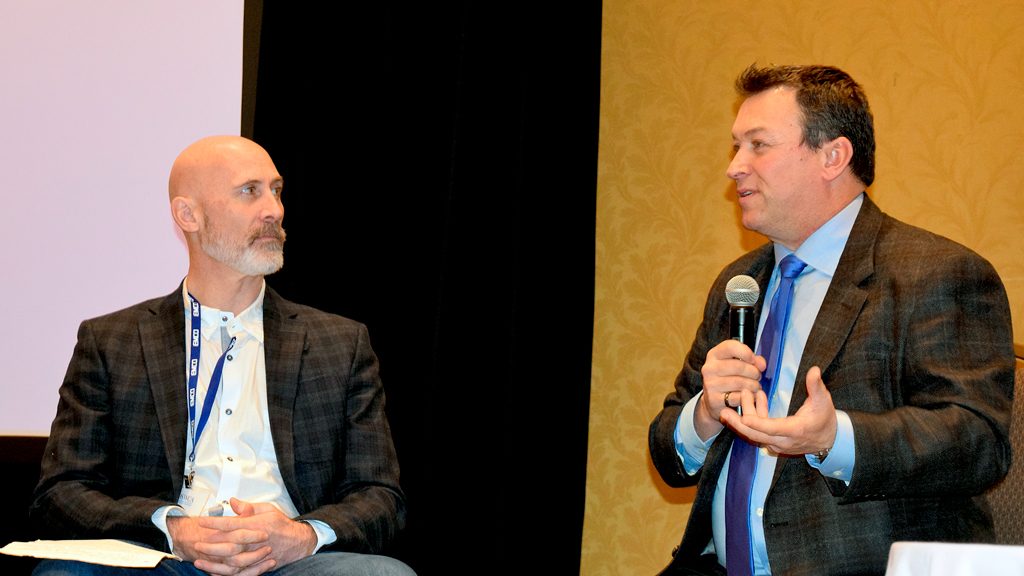The Certificate of Recognition (COR) safety program is making a valuable contribution to the health and safety culture in Ontario, panellists addressing a recent Ontario Sewer and Watermain Construction Association (OSWCA) seminar agreed, but they said that doesn’t mean it can’t be improved.
OSWCA executive director Giovanni Cautillo steered the conversation as facilitator of the panel session held as part of the association’s recent annual meeting in Niagara Falls, Ont. and suggested in an interview afterwards there are a number of questions to be answered as COR becomes more established and such major project owners as the City of Toronto and Metrolinx move to eliminate bids from non-COR-certified firms.
“The whole point of COR, it makes sense for a larger company,” he said. “But 80 per cent of contractors are smaller firms. The whole dialogue was to ensure how can you, as a small shop, obtain COR.
“The reason I raised the City of Toronto, a lot of the smaller contractors are doing $3-million watermain jobs, they’re 20-man crews, they don’t have the wherewithal to get COR.”
The panellists were Stephen Hall, a construction management consultant and founder of the firm Chain Reaction Strategy, and safety consultant Kevin Brown, founder and CEO at Cobalt Safety Consulting.
Brown was a former Ministry of Labour inspector with experience with COR in Alberta and British Columbia. He said in an interview he believes there are flaws in the way COR is being rolled out in Ontario that should be addressed.
This isn’t a cost to your business, this is an investment in your business
— Stephen Hall
Chain Reaction Strategy
“There are things that could be improved upon, and there are things that are fantastic,” he said. “It is finding the strengths and making the weak points stronger. But someone should be asking, are there any weak points in it?
“I am an advocate for it, but I am an advocate for it being better.”
COR is a health and safety audit tool and training program that has been established for 20 years in Alberta and has gained traction within the past decade in Ontario. Certification is granted by the Infrastructure Health and Safety Association (IHSA).
Issues raised by Brown and Hall included its cost, the fact it’s not a health and safety program in itself but mainly an oversight tool, and the staffing, time and effort required to run it.
“It is very important that a company, when they set up their COR program, they are also very cognizant of what they’re trying to accomplish, and why they’re trying to accomplish it, and keep that due diligence position in place,” he said.
COR should have a clearer format, he said, and become more of a safety program.
“There should be a better flow of information from the IHSA, when the auditors are asking for something…so it gives a bit of a forward focus on it,” Brown said.
“I would like to see more focus on some of the killers and contraventions, on falls, trench collapses, struck-by accidents, electrical accidents. That would help bring a stronger change to prevention too.”
The City of Toronto phased in the COR requirement to accommodate small firms. But next Jan. 1, bidders on all projects will need to be COR certified.
Cautillo asked the panellists how a firm with seven or eight employees could accomplish certification. Discussing cost, Brown suggested with all factors considered, including existing health and safety culture, COR certification could cost a firm hundreds of thousands of dollars, though he did not think it was absolutely essential to devote one salary to running the program.
Hall disagreed, saying with scores of documents required to be produced each month, a full-time staffer is needed. But he said COR certification should not be considered a true cost.
“This isn’t a cost to your business, this is an investment in your business. If you do it properly and you manage it well you will get a return on your investment that is greater than the cost,” Hall said.
Both panellists agreed COR has reached the stage where the IHSA must undertake more surveying of COR clients and solicit feedback to make improvements. Hall noted the IHSA is in the process of evaluating reforms.
“The IHSA is making some changes. It is going to be a long, arduous process,” he said. “Outside of that, the only way COR is going to become better is when the IHSA itself does an assessment on it. They are asking us as contractors to go out and do it, we do annual reviews.
“COR, and the IHSA, are going to have to do the same thing now that it has been out there a few years.”
A statement from the IHSA noted the association meets regularly with the Ontario General Contractors Association for feedback, surveys COR participants after program completion, hosts an annual internal auditor event and holds meetings with buyers and a formal COR open house event.








Recent Comments
comments for this post are closed